Aegis
Origin
Latin, from Greek aigis, literally, goatskin, from aig-, aix goat; akin to Armenian ayc goat
Greek ]Αιγίς has three meanings:
- 1. "violent windstorm", from the verb 'αïσσω (stem 'αïγ-) = "I rush or move violently". Akin to "καταιγίς" hurricane.
- 2.The shield of a deity as described above
- 3. "goatskin coat", from treating the word as meaning "something grammatically feminine pertaining to goat" (Greek αἰξ (stem αἰγ-) = "goat", + suffix -ίς (stem ίδ-))
The original meaning may have been #1, and Ζευς 'Αιγιοχος = "Zeus who holds the aegis" may have originally meant "Sky/Heaven, who holds the storm". The transition to the meaning "shield" may have come by folk-etymology among a people familiar with draping an animal skin over the left arm as a shield.
Definitions
- 1: a shield or breastplate emblematic of majesty that was associated with Zeus and Athena
- 2a : protection <under the aegis of the Constitution>
- b : controlling or conditioning influence <many American mothers, under the aegis of benevolent permissiveness … actually neglect their children — Time>
- 3a : auspices, sponsorship <under the aegis of the museum>
- b : control or guidance especially by an individual, group, or system
Description
The Aegis (Greek: Αιγίς), as stated in the Iliad, is the shield or buckler or breastplate of Athena and Zeus, famously bearing Medusa's head, which, according to Homer was fashioned by Hephaestus "... and among them went bright-eyed Athene, holding the precious aegis which is ageless and immortal: a hundred tassels of pure gold hang fluttering from it, tight-woven each of them, and each the worth of a hundred oxen."
The modern concept of doing something "under someone's aegis" means doing something under the protection of a powerful, knowledgeable, or benevolent source. The word aegis is identified with protection by a strong force with its roots in Greek mythology and adopted by the Romans; there are parallels in Norse mythology and in Egyptian mythology as well, where the Greek word aegis is applied by extension.[1]
